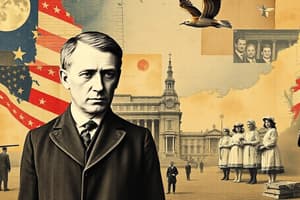Podcast
Questions and Answers
What event prompted Charles Windolph to emigrate to the United States?
What event prompted Charles Windolph to emigrate to the United States?
- Family relocation
- Political persecution
- Economic hardship
- Franco-Prussian War draft (correct)
Charles Windolph found significant job opportunities in New York after emigrating.
Charles Windolph found significant job opportunities in New York after emigrating.
False (B)
On which date did Charles Windolph experience the events on the hill overlooking the Little Big Horn River?
On which date did Charles Windolph experience the events on the hill overlooking the Little Big Horn River?
June 25, 1876
Windolph and other soldiers were part of Major __________'s battalion.
Windolph and other soldiers were part of Major __________'s battalion.
What did Windolph hear that he thought were victory dances?
What did Windolph hear that he thought were victory dances?
The Indian warriors were celebrating the battle after it ended.
The Indian warriors were celebrating the battle after it ended.
Match the following individuals with their recollections of the night on June 25, 1876:
Match the following individuals with their recollections of the night on June 25, 1876:
The relief column arrived on the morning of the __________.
The relief column arrived on the morning of the __________.
What does the text suggest about the historians' approach to writing Indian history?
What does the text suggest about the historians' approach to writing Indian history?
Critical reading is unnecessary when analyzing images and documents.
Critical reading is unnecessary when analyzing images and documents.
What factors should be considered when evaluating historical images?
What factors should be considered when evaluating historical images?
The sources historians use present us with complex ____________ and multiple ways of knowing the world.
The sources historians use present us with complex ____________ and multiple ways of knowing the world.
Match the following terms to their descriptions:
Match the following terms to their descriptions:
How should documents in the study of history be approached?
How should documents in the study of history be approached?
Historic images play no role in shaping our understanding of the past.
Historic images play no role in shaping our understanding of the past.
What is a key theme highlighted in the historical overview provided?
What is a key theme highlighted in the historical overview provided?
What does Momaday believe writing encourages us to do?
What does Momaday believe writing encourages us to do?
Momaday believes that all written documents convey the absolute truth.
Momaday believes that all written documents convey the absolute truth.
What does Leslie Marmon Silko value in words?
What does Leslie Marmon Silko value in words?
Momaday states that words have the power to _____ raging weather.
Momaday states that words have the power to _____ raging weather.
Match the following concepts with their descriptions:
Match the following concepts with their descriptions:
What does Daniel Richter acknowledge about reconstructing the lives of indigenous people?
What does Daniel Richter acknowledge about reconstructing the lives of indigenous people?
Momaday believes that the sound of words is less important than their meaning.
Momaday believes that the sound of words is less important than their meaning.
What does Momaday suggest can happen with too many words?
What does Momaday suggest can happen with too many words?
What did the prophecy made by a Spokane Indian foretell?
What did the prophecy made by a Spokane Indian foretell?
Indians were primarily nomadic hunters without any established trade routes.
Indians were primarily nomadic hunters without any established trade routes.
What kind of economic relations did hunting groups have with farming groups?
What kind of economic relations did hunting groups have with farming groups?
The Navajo people, referred to as the ______ in their own language, settled in the Colorado Plateau region.
The Navajo people, referred to as the ______ in their own language, settled in the Colorado Plateau region.
What was a significant item traded among North American Indian tribes?
What was a significant item traded among North American Indian tribes?
Match the following tribes with their historical details:
Match the following tribes with their historical details:
The ancestors of the Navajo migrated from southern Mexico.
The ancestors of the Navajo migrated from southern Mexico.
What is one of the names given to the First World in relation to First Man?
What is one of the names given to the First World in relation to First Man?
The map depicting agriculture in Native America dates back to the year ______.
The map depicting agriculture in Native America dates back to the year ______.
First Woman was successful in finding the home of First Man on her first attempt.
First Woman was successful in finding the home of First Man on her first attempt.
What does Lucca represent in the context of the Navaho beliefs?
What does Lucca represent in the context of the Navaho beliefs?
The person known as the Great-Coyote-Who-Was-Formed-in-the-____ is described as having hatched from an egg.
The person known as the Great-Coyote-Who-Was-Formed-in-the-____ is described as having hatched from an egg.
Match the following names with their meanings or significance:
Match the following names with their meanings or significance:
Which item did First Man have that was stronger than First Woman's turquoise fire?
Which item did First Man have that was stronger than First Woman's turquoise fire?
What did First Man use to mark the place where the turquoise light burned?
What did First Man use to mark the place where the turquoise light burned?
The narrative describes First Man and First Woman as seeking their respective homes.
The narrative describes First Man and First Woman as seeking their respective homes.
Flashcards are hidden until you start studying
Study Notes
Charles Windolph's Experience
- Charles Windolph emigrated from Prussia to the U.S. in 1870 to avoid the Franco-Prussian War draft.
- After struggling to find work in New York, Windolph joined the army.
- On June 25, 1876, Windolph fought in the Battle of the Little Bighorn, facing overwhelming odds against Lakota and Cheyenne warriors led by Sitting Bull.
- Windolph's battalion was saved from defeat by George Armstrong Custer's diversion but faced a night of uncertainty and dread.
Misunderstanding the Celebration
- Windolph mistook Lakota and Cheyenne mourning songs for victory dances, highlighting a significant cultural misunderstanding.
- Cheyenne warrior Wooden Leg described the somber mood, noting that many were in mourning, expressing grief through self-inflicted wounds.
Perspectives on Oral and Written Traditions
- Writer Scott Momaday emphasized the different value of oral traditions compared to written language, suggesting that oral words are cherished and carry deeper significance.
- Leslie Marmon Silko expressed skepticism towards written statements, as true emotions might be obscured when detached from the speaker's immediate context.
The Historians' Challenges
- Historians face challenges in accessing the true perspectives of historical figures due to biases and the loss of many historical documents.
- Daniel Richter highlighted the complexities and subjective nature of reconstructing native histories, urging acknowledgment of historian bias and sources' limitations.
Constructions of Historical Narrative
- Histories often reflect the perspective of those who write them; diverse documents present multiple viewpoints rather than a singular narrative.
- Critical reading is encouraged to uncover deeper meanings and varied experiences rather than just accepting documented facts at face value.
Visual Representation and Interpretation
- Images used in studies can convey historical narratives but require critical analysis to understand the artist’s intent and context.
- Questions about the purpose, audience, and accuracy of historical images help shape a more nuanced understanding of events.
Native American Agricultural Practices
- Prior to European contact, many Native Americans engaged in farming and maintained complex trade networks, contrary to the stereotype of nomadic lifestyles.
- Indigenous economies were often interdependent, incorporating both farming and hunting with extensive trade routes.
The Navajo Emergence Story
- The Navajo, one of the largest Native American tribes today, emerged into the historical record in the 1620s, distinct from the Apache.
- Their ancestors migrated from Northern Canada, settling in the Colorado Plateau and evolving into a more settled society that integrated farming and herding.
Traditional Narratives of Creation
- Navajo cosmology involved elaborate creation stories featuring First Man and First Woman, highlighting themes of balance and partnership in the universe.
- The narrative focuses on light and fire symbolism as foundational elements in their creation framework, reflecting cultural values and spiritual beliefs.
Studying That Suits You
Use AI to generate personalized quizzes and flashcards to suit your learning preferences.



